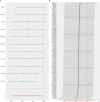Polycystic ovary syndrome and 25-hydroxyvitamin D: A bidirectional two-sample Mendelian randomization study
- PMID: 36967791
- PMCID: PMC10034407
- DOI: 10.3389/fendo.2023.1110341
Polycystic ovary syndrome and 25-hydroxyvitamin D: A bidirectional two-sample Mendelian randomization study
Abstract
Background: Accumulating observational studies have indicated that vitamin D deficiency (serum 25-hydroxyvitamin D (25OHD) < 50 nmol/L) is common in women with polycystic ovary syndrome (PCOS). However, the direction and causal nature remain unclear. In this study, we aimed to investigate the causal association between PCOS and 25OHD.
Methods: A bidirectional two-sample Mendelian randomization (MR) study was used to evaluate the causal association between PCOS and 25OHD. From the publicly available European-lineage genome-wide association studies (GWAS) summary statistics for PCOS (4,890 cases of PCOS and 20,405 controls) and 25OHD (n = 417,580), we selected 11 and 102 single nucleotide polymorphisms (SNPs) as instrumental variables (IVs), respectively. In univariate MR (uvMR) analysis, inverse-variance weighted (IVW) method was employed in the primary MR analysis and multiple sensitivity analyses were implemented. Additionally, a multivariable MR (mvMR) design was carried to adjust for obesity and insulin resistance (IR) as well.
Results: UvMR demonstrated that genetically determined PCOS was negatively associated with 25OHD level (IVW Beta: -0.02, P = 0.008). However, mvMR found the causal effect disappeared when adjusting the influence of obesity and IR. Both uvMR and mvMR analysis didn't support the causal effect of 25OHD deficiency on risk of PCOS (IVW OR: 0.86, 95% CI: 0.66 ~ 1.12, P = 0.280).
Conclusion: Our findings highlighted that the casual effect of PCOS on 25OHD deficiency might be mediated by obesity and IR, and failed to find substantial causal effect of 25OHD deficiency on risk of PCOS. Further observational studies and clinical trials are necessary.
Keywords: 25-hydroxyvitamin D; Mendelian randomization; causal inference; genetic epidemiology; insulin resistance; obesity; polycystic ovary syndrome.
Copyright © 2023 Zhang, Liao, Zhao, Chen, Jia, Yu, Zhu, Wang, Zhang and Liu.
Conflict of interest statement
The authors declare that the research was conducted in the absence of any commercial or financial relationships that could be construed as a potential conflict of interest.
Figures



References
Publication types
MeSH terms
Substances
LinkOut - more resources
Full Text Sources
Medical

